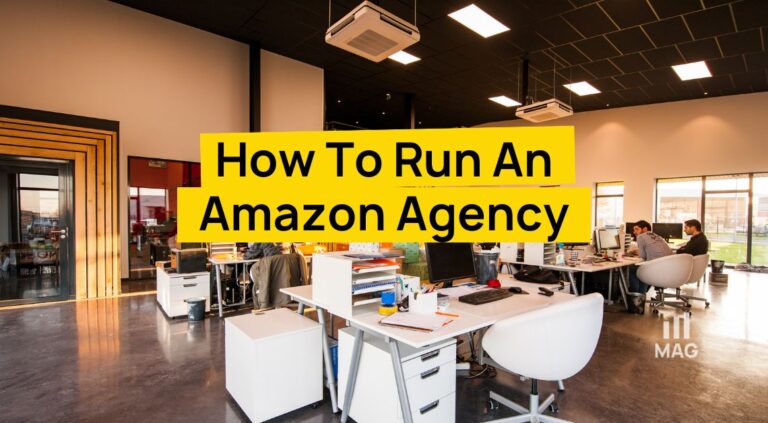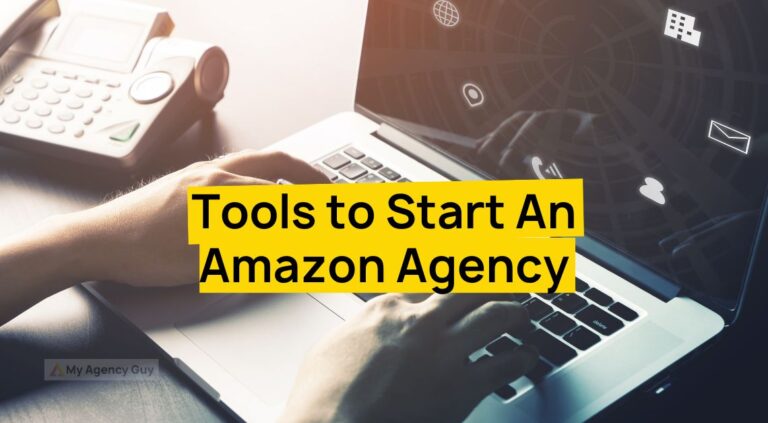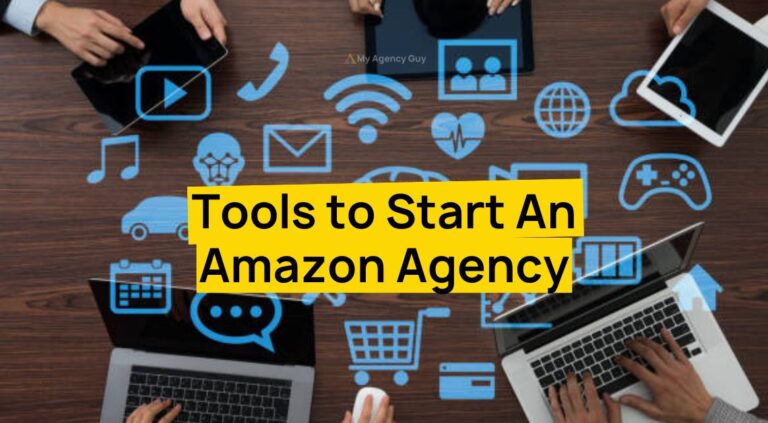Create a Winning Amazon Agency Business Plan: A Step-by-Step Guide
A comprehensive Amazon Agency business plan can be your ticket to success when you’re looking to establish your own company. Much like building a house, your Amazon agency needs a sturdy foundation, and that foundation is your business plan.
In this article, we’ll delve into every aspect, providing you with the insights and expertise you need to make your agency thrive. Let’s get started.
How Important Is A Winning Amazon Agency Business Plan
A winning Amazon agency business plan is essential for any new agency to secure funding, attract clients, and achieve its growth goals. It demonstrates a comprehensive understanding of market opportunities and the competitive landscape, the viability of the proposed strategy and financial projections, and capabilities to execute effectively and achieve growth goals.
In the increasingly competitive Amazon marketing industry, a well-developed plan gives investors and partners confidence that the agency founders have a sound foundation to deliver results for clients and build a sustainable, profitable business over the long run.
Here are some of the key benefits of having a winning Amazon agency business plan:
- Secure funding: Investors are more likely to provide funding to businesses with a well-developed business plan. This is because it shows that the business has been carefully thought out and that the founders have a clear vision for the future.
- Attract clients: Potential clients are also more likely to choose an Amazon agency with a solid business plan. This is because it shows that the agency is serious about its business and that it has the skills and experience necessary to deliver results.
- Achieve growth goals: A business plan can help Amazon agencies achieve their growth goals by providing a roadmap for success. It can help to identify key milestones, track progress, and make necessary adjustments along the way.
- Demonstrate expertise: A well-written business plan can be a powerful marketing tool for Amazon agencies. It can help to demonstrate the agency’s expertise in the Amazon marketplace and its ability to help clients succeed.
- Strategic Blueprint: Every aspiring Amazon agency should craft a strategic blueprint before embarking on its journey. Notably, financial institutions and potential investors often require a comprehensive business plan as a prerequisite for funding consideration.
- Goal-Centric Approach: Beyond securing financial backing, a well-structured business plan serves as a compass, guiding the agency toward its objectives.
“Entrepreneurs with formal business plans have 16% more likelihood of viability vs entrepreneurs with no formal business plans.” - Harvard Business Review article
- Continuous Evolution: A business plan is not a static document. It should be a dynamic tool, subject to regular review and updates. This process allows for the incorporation of realized goals and adjustments for those that may have shifted. Even established Amazon agencies pivoting in a new direction may find it prudent to create a fresh business plan to steer their transformation.
"Any business plan won't survive its first encounter with reality. The reality will always be different. It will never be the plan."
Jeff Bezos Tweet
When to Update An Amazon Agency Business Plan
The frequency of business plan revisions indeed varies based on the nature of the business and its operating environment. Here’s a condensed version of your statement:
- Nature Determines Frequency: The need to revise a business plan hinges on the business’s characteristics.
- Established Businesses: Well-established businesses may opt for annual reviews to assess the plan’s relevance and make adjustments when needed.
- Dynamic Environments: New or rapidly growing businesses operating in highly competitive markets might find it necessary to revise their plans more frequently, potentially on a quarterly basis.
- Adaptability and alignment with the business’s specific context are key in determining the right revision schedule for a business plan.

1. Winning Amazon Agency Business Plan Executive Summary
Business Goals
When setting business goals for an Amazon agency, it is important to consider the following factors:
- Target market: Who are your ideal clients? What are their needs and goals?
- Competitive landscape: What are the strengths and weaknesses of your competitors?
- Resources: What resources do you have available to you, such as time, money, and expertise?
- Vision: What do you want your Amazon agency to achieve in the long term?
Once you have considered these factors, you can start to develop specific business goals. Some common business goals for Amazon agencies include:
- Increase revenue: This is a common goal for any business, but it is especially important for Amazon agencies. As the Amazon marketplace continues to grow, there are many opportunities for agencies to increase their revenue.
- Expand into new markets: If you are currently focused on a specific niche market, you may want to consider expanding into new markets. This can help you to reach a larger audience and increase your revenue potential.
- Launch new services: As the Amazon marketplace evolves, new opportunities for agencies are emerging. You may want to consider launching new services to meet the needs of your clients and stay ahead of the competition.
- Improve client satisfaction: It is important to focus on improving client satisfaction. This will help you to retain your existing clients and attract new ones.
- Build a strong brand: A strong brand can help you to differentiate yourself from the competition and attract new clients.
Target Market
When choosing a target market for an Amazon agency, it is important to consider the following factors:
- Your expertise: What areas of Amazon marketing do you have the most expertise in?
- Your resources: What resources do you have available to you, such as time, money, and staff?
- The market opportunity: How big is the market for your target market? Is it growing or shrinking?
- The competitive landscape: Who are your competitors? What are their strengths and weaknesses?
Once you have considered these factors, you can start to narrow down your target market. Some common target markets for Amazon agencies include:
- Small businesses: Small businesses often need help with Amazon marketing, but they may not have the budget to hire a large agency.
- Established businesses: Established businesses may have the budget to hire a large agency, but they may be looking for a more specialized agency that can help them with specific areas of Amazon marketing.
- Businesses in specific industries: There are a number of Amazon agencies that specialize in specific industries, such as fashion, electronics, and home goods.
- Businesses with specific needs: Some Amazon agencies specialize in working with businesses with specific needs, such as businesses that are launching new products or businesses that are expanding into new markets.
It is important to note that you do not have to choose just one target market. You can target multiple markets, but it is important to make sure that you have the resources and expertise to serve all of your target markets effectively.
When choosing a target market, it is also important to be specific. For example, instead of targeting “small businesses,” target “small businesses that sell fashion products on Amazon.” The more specific you are, the easier it will be to develop marketing and sales strategies that resonate with your target market.
Once you have chosen a target market, you should develop a deep understanding of their needs and goals. This will help you to develop customized solutions that meet their unique needs.
Competitive Advantage
The competitive advantage section of an Amazon agency business plan should highlight the unique factors that set the agency apart from its competitors. This could include:
- Expertise: What areas of Amazon marketing does the agency have the most expertise in?
- Experience: How long has the agency been in business? What are their track record and success stories?
- Team: Does the agency have a team of experienced and qualified professionals?
- Technology: Does the agency use the latest technology and tools to help its clients succeed?
- Services: Does the agency offer a wide range of services to meet the needs of its clients?
- Pricing: Is the agency’s pricing competitive?
- Customer service: Is the agency known for its excellent customer service?
It is important to be specific and measurable when describing your competitive advantage. For example, instead of saying that you have a “team of experienced professionals,” you could say that you have a “team of Amazon marketing experts with over 10 years of experience.”
You should also highlight your competitive advantage in your marketing and sales materials. This will help you to differentiate yourself from the competition and attract new clients.
Here are some examples of competitive advantages that Amazon agencies can include in their business plans:
- Expertise in a specific niche: For example, an agency that specializes in launching new products on Amazon.
- Experience with a specific type of client: For example, an agency that specializes in working with small businesses.
- A team of experts with a wide range of skills: For example, an agency that has experts in Amazon PPC, SEO, and social media marketing.
- A proprietary technology platform: For example, an agency that has developed a software platform that helps its clients manage their Amazon accounts.
- A commitment to customer service: For example, an agency that offers 24/7 support to its clients.
By highlighting your competitive advantage in your business plan and marketing materials, you can position your Amazon agency for success.
2. Winning Amazon Agency Business Plan: Company Description
Your company description should provide a brief overview of your Amazon agency, including your mission, values, and what makes you unique. It should also highlight the services you offer, your pricing structure, and your team.
Services Offered
The services that an Amazon agency offers will vary depending on the agency’s specialization and target market. However, some common services offered by Amazon agencies include:
- Product launch and optimization: This service helps sellers launch new products on Amazon and optimize their existing product listings for better visibility and sales.
- PPC management: This service helps sellers create and manage PPC campaigns to drive traffic and sales to their Amazon listings.
- SEO: This service helps sellers optimize their Amazon listings for search engines so that they appear higher in search results.
- Social media marketing: This service helps sellers use social media to promote their Amazon products and build relationships with potential customers.
- Content marketing: This service helps sellers create and distribute high-quality content to attract and engage potential customers.
- Customer service: This service helps sellers provide excellent customer service to their Amazon customers.
In addition to these core services, Amazon agencies may also offer more specialized services, such as:
- Brand management: This service helps sellers build and manage their brands on Amazon.
- Account management: This service helps sellers manage their Amazon accounts, including their listings, inventory, and orders.
- Strategic planning: This service helps sellers develop and implement strategic plans to achieve their Amazon sales goals.
- Creative services: This service helps sellers create and manage their Amazon listings, product images, and other creative assets.
When choosing the services to offer, it is important to consider the needs of your target market and the expertise of your team. You should also focus on offering services that are in high demand and that can help your clients achieve their goals.
Here are some tips for choosing the services to offer in your Amazon agency:
- Consider the needs of your target market. What services do they need and want?
- Focus on services that are in high demand. What services are other Amazon agencies offering?
- Offer services that are complementary. For example, you could offer both product launch and optimization services, as well as PPC management services. This would allow you to provide your clients with a comprehensive solution for their Amazon marketing needs.
- Highlight your team’s expertise. What services does your team have the most experience in?
By carefully choosing the services to offer, you can position your Amazon agency for success.
Pricing
The pricing that an Amazon agency offers will vary depending on the agency’s services, target market, and competitive landscape. However, some common pricing models used by Amazon agencies include:
- Flat fee per month: This model charges a fixed monthly fee for a set of services. This is a good option for clients who want a predictable monthly expense.
- Percentage of sales: This model charges a percentage of the client’s Amazon sales. This is a good option for clients who are confident in their ability to generate sales.
- Hour-based: This model charges a set hourly rate for the agency’s services. This is a good option for clients who need help with specific tasks or projects.
Some Amazon agencies may also offer a combination of these pricing models. For example, an agency may charge a flat fee per month for a set of core services, with additional services charged on an hourly basis.
When choosing a pricing model, it is important to consider the following factors:
- Your costs: What are your costs associated with providing your services?
- Your target market: What are your clients willing to pay?
- Your competitive landscape: What are other Amazon agencies charging?
It is also important to be transparent with your clients about your pricing. Make sure to clearly communicate your pricing structure and any potential additional fees.
Here are some tips for pricing your Amazon agency services:
- Calculate your costs: What are your costs associated with providing your services? This includes things like salaries, benefits, software, and marketing.
- Research your competitors: What are other Amazon agencies charging for similar services?
- Consider your target market: What are your clients willing to pay?
- Offer value-based pricing: Price your services based on the value you provide to your clients.
- Be transparent: Clearly communicate your pricing structure and any potential additional fees to your clients.
By carefully choosing a pricing model and pricing your services appropriately, you can position your Amazon agency for success.
Team
The team section of your Amazon agency business plan should highlight the key members of your team and their experience and qualifications. This will help potential clients feel confident that you have the skills and expertise necessary to help them succeed.
When describing your team, be sure to include the following information:
- Name: The name of each team member
- Title: The title of each team member
- Experience: The number of years of experience each team member has in the Amazon marketing industry
- Qualifications: Any special qualifications or training that each team member has
You may also want to include a brief bio for each team member. This is a good opportunity to highlight their individual strengths and expertise.
Here is an example of a team section from an Amazon agency business plan:
Our team is made up of experienced and qualified Amazon marketing experts. We have a deep understanding of the Amazon marketplace and the latest trends and strategies. We are committed to providing our clients with the highest quality services and support.
Key Team Members:
- John Smith: CEO and Founder. John has over 10 years of experience in the Amazon marketing industry. He is a certified Amazon PPC specialist and has helped clients generate millions of dollars in sales on Amazon.
- Jane Doe: COO and Co-Founder. Jane has over 5 years of experience in the Amazon marketing industry. She is an expert in Amazon SEO and product optimization.
- Mike Jones: Account Manager. Mike has over 3 years of experience in the Amazon marketing industry. He is responsible for managing client accounts and ensuring that they are meeting their goals.
- Susan Williams: PPC Specialist. Susan has over 2 years of experience in Amazon PPC management. She is responsible for creating and managing PPC campaigns for clients.
- David Miller: SEO Specialist. David has over 1 year of experience in Amazon SEO. He is responsible for optimizing client product listings for search engines.
We are proud of our team and their expertise in the Amazon marketing industry. We are confident that we can help our clients achieve their Amazon sales goals.
By including a team section in your business plan, you can show potential clients that you have the skills and experience necessary to help them succeed.

3. Winning Amazon Agency Business Plan: Market Analysis
Amazon Marketplace
The Amazon marketplace is the world’s largest online retailer, with over 310 million active customer accounts. Amazon offers a wide range of products, including books, electronics, clothing, home goods, and more.
The Amazon marketplace is growing rapidly, with revenue increasing by 22% in 2021. This growth is being driven by a number of factors, including:
- The increasing popularity of online shopping
- The expansion of Amazon’s product selection
- Amazon’s convenient and reliable shipping options
Target Market
The target market for Amazon agencies is broad and includes businesses of all sizes, from small businesses just starting out on Amazon to large enterprises with established Amazon accounts.
Some common types of businesses that use Amazon agencies include:
- Small businesses: Small businesses often need help with Amazon marketing, but they may not have the budget to hire a large agency.
- Established businesses: Established businesses may have the budget to hire a large agency, but they may be looking for a more specialized agency that can help them with specific areas of Amazon marketing.
- Businesses in specific industries: There are a number of Amazon agencies that specialize in specific industries, such as fashion, electronics, and home goods.
- Businesses with specific needs: Some Amazon agencies specialize in working with businesses with specific needs, such as businesses that are launching new products or businesses that are expanding into new markets.
Competitors
The competitive landscape for Amazon agencies is competitive, but there are still opportunities for new agencies to succeed.
When developing your competitive strategy, it is important to consider the following factors:
- Your target market: Who are you targeting? What are their needs and goals?
- Your competitive advantage: What makes your agency different from the competition?
- Your pricing strategy: How will you price your services?
- Your marketing strategy: How will you attract new clients?
By carefully considering these factors, you can develop a competitive strategy that will help you succeed in the Amazon agency market.
Here are some tips for developing a winning Amazon agency business plan:
- Do your research: Understand the Amazon marketplace, your target market, and your competitors.
- Define your value proposition: What makes your agency different and why should clients choose you?
- Set clear goals: What do you want to achieve with your Amazon agency?
- Develop a marketing strategy: How will you attract new clients?
- Create a financial plan: How will you generate revenue and cover costs?
- Assemble a team of experts: Surround yourself with experienced and qualified professionals.
4. Winning Amazon Agency Business Plan: Marketing Strategy
Attracting New Clients
There are a number of ways to attract new clients for your Amazon agency. Here are a few tips:
- Create a strong online presence: Your website should be well-designed and informative. It should also be optimized for search engines so that potential clients can easily find you.
- Publish high-quality content: Write blog posts, articles, and e-books that provide valuable information to potential clients. This will help you establish yourself as an expert in the Amazon marketing industry and attract their attention.
- Attend industry events: Attend industry events and conferences to meet potential clients and network with other professionals.
- Use social media: Use social media to connect with potential clients and promote your services. Be sure to share informative content and engage with your audience.
- Run paid advertising campaigns: You can run paid advertising campaigns on platforms like Google Ads and LinkedIn Ads to reach potential clients who are actively searching for Amazon marketing services.
Promoting Services
Once you have attracted potential clients, you need to promote your services to them. Here are a few tips:
- Highlight your unique selling proposition: What makes your Amazon agency different and why should clients choose you? Be sure to highlight your unique selling proposition in all of your marketing materials.
- Showcase your results: Share case studies and testimonials from satisfied clients. This will help potential clients see the value of your services and be more likely to choose you.
- Offer free consultations: Offer free consultations to potential clients. This is a great way to learn more about their needs and goals and to show them how your services can help them achieve their goals.
- Run special promotions: Run special promotions and discounts to encourage potential clients to try your services.
By following these tips, you can attract new clients and promote your Amazon agency services to them effectively.
Additional tips for creating a winning Amazon agency marketing strategy:
- Focus on your target market: Who are you trying to reach? What are their needs and goals? Tailor your marketing messages accordingly.
- Be consistent: Be consistent with your marketing efforts. This means creating and sharing new content regularly and running paid advertising campaigns on a regular basis.
- Track your results: Track the results of your marketing efforts so that you can see what’s working and what’s not. This will help you improve your marketing strategy over time.
5. Winning Amazon Agency Business Plan: Financial Projections
The financial projections section of your Amazon agency business plan is important because it shows potential investors and partners that you have a viable business model and that you can generate revenue and cover costs.
Revenue
The revenue section of your financial projections should show how you plan to generate revenue for your Amazon agency. Some common sources of revenue for Amazon agencies include:
- Monthly retainer fees: This is a recurring fee that clients pay each month for your services.
- Pay-per-click (PPC) management fees: You can charge a percentage of your clients’ PPC spend for managing their campaigns.
- Product launch fees: You can charge a fee for helping clients launch new products on Amazon.
- Other services: You may also offer other services, such as SEO, social media marketing, and content marketing. You can charge a fee for these services on a monthly basis or on a project-by-project basis.
Expenses
The expenses section of your financial projections should show all of the costs associated with running your Amazon agency. Some common expenses for Amazon agencies include:
- Salaries and benefits: This is typically the largest expense for Amazon agencies. You will need to factor in the salaries and benefits of your employees when calculating your expenses.
- Marketing and advertising: You will need to spend money on marketing and advertising to attract new clients. This may include costs for online advertising, attending industry events, and creating marketing materials.
- Software and tools: You will need to use software and tools to provide your services to clients. This may include costs for Amazon Seller Central, PPC management software, and SEO tools.
- Other expenses: You may also have other expenses, such as office rent, utilities, and travel expenses.
Cash Flow
The cash flow section of your financial projections should show how much cash you expect to have on hand at any given time. This is important because it shows potential investors and partners that you have enough cash to cover your expenses and grow your business.
To calculate your cash flow, you will need to subtract your expenses from your revenue. You will also need to factor in any changes in your working capital, such as changes in inventory levels or accounts receivable.
Tips for creating winning Amazon agency financial projections:
- Be realistic:** Your financial projections should be based on realistic assumptions about your revenue and expenses. Don’t overstate your revenue or underestimate your expenses.
- Be specific:** Your financial projections should be specific and detailed. Avoid making vague statements or generalizations.
- Be flexible:** Your financial projections should be a living document that you can update as needed. The Amazon marketplace is constantly changing, so it’s important to be able to adapt your financial projections accordingly.

6. Winning Amazon Agency Business Plan: Operations
The operations plan section of your Amazon agency business plan is important because it shows potential investors and partners that you have a clear and well-defined plan for running your business. This section should outline your business processes, technology needs, and staffing requirements.
Business Processes
Your business processes should be designed to efficiently and effectively deliver your services to your clients. Some common business processes for Amazon agencies include:
- Client intake and onboarding: This process involves qualifying new clients, understanding their needs and goals, and setting up their accounts.
- Account management: This process involves managing client accounts on a daily basis, including monitoring performance, making adjustments to campaigns, and providing customer support.
- Service delivery: This process involves providing the specific services that you offer, such as product launch and optimization, PPC management, and SEO.
- Quality assurance: This process involves ensuring that your services are delivered to a high standard of quality.
Technology Needs
Amazon agencies rely on a variety of technology tools to provide their services to their clients. Some common technology needs for Amazon agencies include:
- Amazon Seller Central: This is the platform that Amazon sellers use to manage their accounts.
- PPC management software: This software helps Amazon sellers to create and manage their PPC campaigns.
- SEO tools: These tools help Amazon sellers to optimize their product listings for search engines.
- Other tools: Amazon agencies may also use other tools, such as customer relationship management (CRM) software and project management software.
Staffing Requirements
The staffing requirements for an Amazon agency will vary depending on the size and scope of the agency. However, some common staffing requirements for Amazon agencies include:
- Account managers: Account managers are responsible for managing client accounts and ensuring that they are meeting their goals.
- PPC specialists: PPC specialists are responsible for creating and managing PPC campaigns for clients.
- SEO specialists: SEO specialists are responsible for optimizing client product listings for search engines.
- Content writers: Content writers are responsible for creating high-quality content for clients, such as blog posts, articles, and product descriptions.
- Other staff: Amazon agencies may also need to hire other staff, such as customer service representatives and office managers.
Here are some tips for creating a winning Amazon agency operations plan:
- Be specific and detailed: Your operations plan should be specific and detailed. It should clearly outline your business processes, technology needs, and staffing requirements.
- Be realistic: Your operations plan should be realistic and achievable. Don’t try to do too much with too few resources.
- Be flexible: The Amazon marketplace is constantly changing, so it’s important to be flexible with your operations plan. Be prepared to make adjustments as needed.
7. Winning Amazon Agency Business Plan: Product Development
New Services To Offer
The product development section of an Amazon agency business plan should outline the agency’s process for developing and launching new products on Amazon. This section should include the following:
- Product research and selection: How will the agency identify and select new products to launch on Amazon?
- Product development: How will the agency develop new products, including designing, sourcing, and manufacturing?
- Product launch: How will the agency launch new products on Amazon, including creating listings, optimizing for search engines, and running paid advertising campaigns?
- Product optimization: How will the agency optimize existing product listings to improve sales and ranking?
In addition to these core elements, the product development section of an Amazon agency business plan may also include the following:
- Product branding: How will the agency develop and manage the brands of its clients’ products?
- Product packaging: How will the agency design and produce packaging for its clients’ products?
- Product photography: How will the agency create high-quality product photos for its clients’ listings?
- Product reviews: How will the agency help its clients to generate positive product reviews?
By including a product development section in its business plan, an Amazon agency can show potential clients that it has a clear and well-defined process for launching and optimizing products on Amazon.
Here are some tips for creating a winning Amazon agency product development plan:
- Focus on the customer: When selecting and developing new products, always focus on the needs and wants of the customer. What products are people searching for on Amazon? What problems are they trying to solve?
- Be data-driven: Use data to inform your product development decisions. This includes data on customer search trends, product reviews, and competitor analysis.
- Be creative: Don’t be afraid to think outside the box and develop new and innovative products. The Amazon marketplace is constantly evolving, so it’s important to be able to stay ahead of the curve.
- Be patient: It takes time to develop and launch successful products on Amazon. Don’t expect to see results overnight.
How To Improve Existing Services
The existing services improvement section of an Amazon agency business plan should outline the agency’s plans for improving its existing services. This section should include the following:
- Customer feedback: How will the agency collect and analyze customer feedback to identify areas for improvement?
- Market research: How will the agency conduct market research to stay up-to-date on the latest trends and technologies in Amazon marketing?
- Team training: How will the agency train its team members on the latest Amazon marketing strategies and best practices?
- Process optimization: How will the agency optimize its internal processes to improve efficiency and deliver better results for clients?
In addition to these core elements, the existing services improvement section of an Amazon agency business plan may also include the following:
- New service development: How will the agency develop new services to meet the changing needs of its clients and the Amazon marketplace?
- Technology investment: How will the agency invest in new technology to improve its services?
- Partnerships: How will the agency partner with other companies to offer its clients a wider range of services?

8. Winning Amazon Agency Business Plan: Growth Plan
How To Increase Sales
The sales increase plan section of an Amazon agency business plan should outline the agency’s plans for increasing its sales in the coming years. This section should include the following:
- Target market: Who is the agency targeting with its sales increase plan? Is it new clients, existing clients, or both?
- Sales goals: What are the agency’s sales goals for the next few years?
- Sales strategies: What sales strategies will the agency use to achieve its sales goals? This could include things like lead generation, cold calling, email marketing, and social media marketing.
- Sales team: How will the agency structure and manage its sales team?
- Sales metrics: How will the agency track and measure its sales performance?
In addition to these core elements, the sales increase plan section of an Amazon agency business plan may also include the following:
- Sales budget: How much money will the agency invest in its sales increase plan?
- Sales tools and resources: What sales tools and resources will the agency use to support its sales team?
- Sales training: How will the agency train its sales team on the latest sales strategies and best practices?
By including a sales increase plan section in its business plan, an Amazon agency can show potential investors and partners that it has a clear and well-defined plan for growing its sales in the coming years.
How to expand into new markets
The expanding into new markets section of a winning Amazon agency business plan should outline the agency’s plans for entering new markets, such as new countries or new product categories. This section should include the following:
- Target markets: What new markets is the agency targeting? Why are these markets attractive?
- Market research: What market research has the agency done to understand the target markets? What are the opportunities and challenges in each market?
- Competitive landscape: Who are the agency’s competitors in the target markets? What are their strengths and weaknesses?
- Entry strategy: How will the agency enter the target markets? What are the costs and risks involved?
- Marketing and sales strategy: How will the agency market and sell its services to clients in the target markets?
- Team and resources: What team and resources will the agency need to support its expansion into new markets?
- Financial projections: What are the agency’s revenue and expense projections for the new markets?
- Timeline: What is the agency’s timeline for expanding into the new markets?
- Exit strategy: How does the agency plan to exit the new markets in the future?
9. Winning Amazon Agency Business Plan: Exit Strategy
Including an exit strategy in an Amazon agency’s business plan can be a valuable and prudent decision. Here are some reasons why it’s beneficial:
- Investor Confidence: If you are seeking external investments or partnerships, having a well-defined exit strategy can instill confidence in potential investors or partners. It shows that you’ve thoroughly considered the future of the business.
- Risk Mitigation: An exit strategy provides a clear roadmap for how to exit the business under various circumstances, reducing the risk of unexpected, unfavorable outcomes.
- Goal Alignment: It helps align the agency’s long-term goals with the intentions of the founders or key stakeholders. Whether it’s selling the agency, passing it to a successor, or another path, an exit strategy ensures everyone is on the same page.
- Contingency Planning: In the unpredictable world of Amazon, having an exit plan can serve as a contingency in case market conditions or business circumstances change unexpectedly.
While it’s not a requirement, including an exit strategy in your business plan can be a proactive and strategic move, demonstrating that you’ve considered the agency’s long-term sustainability and growth.
Plans For Exiting The Business
There are a number of different ways to exit a business, including:
- Selling the business: This is the most common way to exit a business. You can sell your business to another individual or company, or you can sell it to a private equity firm.
- Going public: This involves raising money from investors by selling shares of your company on a stock exchange.
- Passing the business down to family members: If you have family members who are interested in running your business, you can pass it down to them.
- Liquidating the business: This involves selling off all of the assets of your business and closing it down.
The best way to exit your business will depend on your individual circumstances and goals. If you’re not sure which option is right for you, it’s important to seek professional advice.
Here are some tips for developing a plan for exiting your business:
- Start planning early: It’s important to start planning your exit strategy early, even if you don’t plan to exit the business for several years. This will give you time to develop a well-thought-out plan and to implement it effectively.
- Set realistic goals: What are your goals for exiting the business? Do you want to maximize the value of the business, ensure the continued success of the business, or something else? Once you know your goals, you can develop a plan to achieve them.
- Consider all of your options: There are a number of different ways to exit a business. Be sure to consider all of your options before making a decision.
- Get professional help: If you’re not sure how to create an exit plan, consider working with a professional advisor, such as a business consultant or an M&A advisor. They can help you to develop a customized plan that meets your specific needs and goals.
- Be flexible: The Amazon marketplace is constantly changing, so it’s important to be flexible with your exit plan. Be prepared to make adjustments as needed.
10. Winning Amazon Agency Business Plan: Room For Errors
While an Amazon agency’s business plan is a valuable tool, it’s not an infallible guarantee of success. There are several factors to consider:
- Realism of Assumptions: Sometimes, a business plan’s initial assumptions and projections may be overly optimistic or unrealistic, especially in the dynamic Amazon ecosystem.
- Market Dynamics: Amazon’s marketplace is ever-evolving, and the broader economy can change unexpectedly. These shifts can disrupt even the most well-crafted plans.
- Competitive Surprises: The Amazon landscape is highly competitive. A sudden, game-changing product or service introduced by a competitor can necessitate rapid adjustments.
To navigate these challenges effectively, it’s crucial to build adaptability and flexibility into your Amazon agency’s plan. This enables you to pivot and adapt to changing circumstances when required.

11. Winning Amazon Agency Business Plan: Best Practices
Here are some best practices for an Amazon agency to follow when creating a business plan:
- Conduct thorough market research: Analyze the size and growth of the Amazon services industry, target customer needs, and competitive landscape.
- Clearly define services: Outline the specific Amazon marketing/advertising/consulting services to be offered.
- Know your customers: Develop detailed profiles of ideal client types/industries.
- Set measurable goals: Establish objectives for revenue, clients, and staff over 3-5 years that can be tracked.
- Detail operations: Describe workflows, systems, partnerships/resources needed to deliver high-quality services.
- Create financial projections: Forecast startup costs, operating expenses, profit/loss, and cash flow using conservative assumptions.
- Develop sales & marketing strategies: Outline how the agency will acquire and retain clients cost-effectively.
- Anticipate challenges: Address potential risks, regulatory changes, and competitive threats with mitigation plans.
- Highlight experience: Emphasize founders’ relevant Amazon expertise to ensure clients of capabilities.
- Request appropriate funding: Ask for capital needs realistically based on financials and growth timeline.
- Edit thoroughly: Ensure the plan is clear, concise, and free of errors with an engaging executive summary.
To learn more about building an agency, here are some videos you can watch:
Conclusion
An Amazon agency business plan isn’t just a formality; it’s a roadmap to your success. It’s a testament to your commitment to understanding the Amazon marketplace, your dedication to outshining your competitors, and your capacity to deliver results for your clients.
By creating a business plan that embodies your vision and strategy, you’ll secure funding, build partnerships, and set your Amazon agency on a path to growth and prosperity. So, get ready to write your Amazon agency success story – one well-crafted plan at a time.






